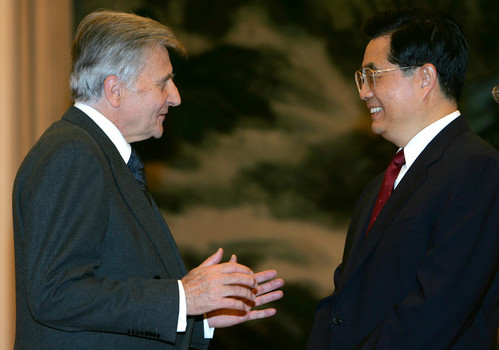
Finance experts call for a new global financial order at Beijing conference
INTRODUCTION
Interestingly, China, along with Russia and other BRICS nations, are already forging ahead with a new global financial system that both parallels and competes with the current system of finance controlled by the West through the dollar and SWIFT systems. In just this year alone, China has opened a new global bank that will accomplish all the functions that the World Bank and IMF do, and Russia has broken through the once impregnable petro-dollar system by allowing oil and natural gas to be bought and sold using either Roubles or Yuan.
*******************************

On Nov. 5, top financial experts concluded a conference held in Beijing, China to discuss economic reforms and how the current global financial system could be adapted or changed to function in a rapidly evolving monetary environment. Members of a Chinese think tank, along with the former President of the European Central Bank, Jean-Claude Trichet, and former Prime Minister of Australia, Kevin Rudd were all in attendance at the event, and agreed that the current system of international finance was quickly becoming outdated in its ability to deal with events emerging in a new global paradigm.
Topics at the International Finance Forum (IFF) included: new frameworks and rules needed for evolving financial markets, how to deal with and incorporate emerging markets into the global system, economic transitions, and financial reforms.
At the heart of the discussion was the growing power of the Yuan and China's influence in the global economy, and how the first or second (dependent upon which metric one uses) largest economy in the world can and is shaping monetary policy after decades of U.S. and dollar hegemony over trade, energy, and economic expansion.
A new global financial order is essential in the rapidly changing global economy, and strategic dialogues and cooperation are needed to reform the current system, international financial experts said at a forum in Beijing.
"The world today is facing a revolution. It is imperative to construct a new global financial framework and to formulate new rules for global financial market," said Cheng Siwei, chairman of the International Financial Forum (IFF).
"The new global framework, new global rules, global balance and global governance require us to engage in renewed strategic dialogue and thinking," Cheng added.
"The global economy and global finance is at the turning point in a way," Jean-Claude Trichet, former president of the European Central Bank, also a co-chairman of the IFF, told the forum via a video link.
"The world has gone through the global financial crisis ... new rules have been discussed not only inside the advanced economies, but with all emerging economies, including the most important emerging economies, namely, China." Trichet said. - China Daily
Interestingly, China, along with Russia and other BRICS nations, are already forging ahead with a new global financial system that both parallels and competes with the current system of finance controlled by the West through the dollar and SWIFT systems. In just this year alone, China has opened a new global bank that will accomplish all the functions that the World Bank and IMF do, and Russia has broken through the once impregnable petro-dollar system by allowing oil and natural gas to be bought and sold using either Roubles or Yuan.
In the new global paradigm of finance, no nation or coalition is an island, and all economies in one form or another are interlocked through an economic system that causes chain reactions across the globe when crises strikes one major power or another. No longer is it just the rest of the world that catches cold when the U.S. sneezes, but now even America feels the financial brunt of when the EU or Japan experiences a monetary calamity.
With over $1.4 quadrillion in derivatives suffocating the global financial system, and nations being forced to devalue their currencies just to survive a regional and global trade war, financiers are recognizing that the current global financial system is broken and is creating a scenario of two choices. Either major reforms are needed to halt the potential of a worldwide collapse, or the entire system must be reset, with several major economic powers losing rights and authorities they once held control over, and allow the new emerging markets in the East to be equal or dominant players in a new system.
